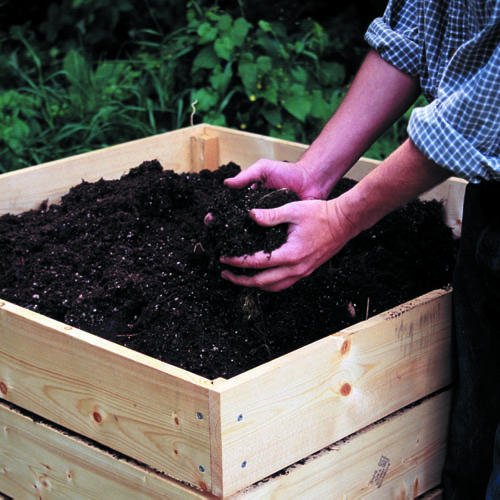
Know How To Do Composting At Domestic And Community Level To Minimise Waste
6 Dec 2017 12:13 PM GMT
Even as we are worrying about the ever-increasing pollution levels, there are certain initiatives taken (or should be taken) at domestic and community levels that offer a realm of hope to our ecosystem. One of them is composting which is a natural process of recycling decomposed organic material into a rich soil known as compost. The compost acts as a perfect food to make our soil healthy and the outcome organic. And the good news is that the raw material is present in every household in our garbage bins.
According to the Ministry of Environment and Forests’ report, our country generates 62 million tonnes of waste every year. While 75-80% of the municipal waste gets collected, only 22-28 % of this waste is processed and treated. The complete report can be read here.
Today’s requirement is decentralisation of waste management or in simple words, we need to treat our own waste and avail the benefits. The least that we can do to reduce our carbon footprints is to segregate the waste into dry and wet before disposing it into municipality bins. Due to poor or no source segregation, municipalities in India are currently able to compost only 0.21 % of the wet waste. Each one of us is bearing the brunt of our negligence in the form of landfills, stench, pollution and consecutive diseases.
How to start:
Based on the science behind composting, we need to make an alternate thin layer of carbon-rich brown material and nitrogen-rich green material in our compost pile with some soil and water in between.
The mentioned 6.5 easy steps can be followed to compost our kitchen waste.
- Separate the edible kitchen waste (vegetable peels, fruit peels, small amounts of wasted cooked food) in a container.
- Collect dry organic matter (dried leaves, sawdust) in a small container
- Take a large earthen pot or a bucket and make 4 – 5 holes around the container at different levels to let air inside.
- Line the bottom with a layer of soil.
- Add food waste in layers alternating wet waste (food scraps, vegetable and fruit peels) with dry waste (straw, sawdust, dried leaves).
- Cover this container with a plastic sheet or a plank of wood to help retain moisture and heat.
The more finely chopped the material, the faster it will decompose. Every few days, we should give the pile a quick turn to provide aeration. If the pile seems to be too dry, sprinkle some water to make it moist. In almost two – three months, our compost would be ready to use.
Composting in cities:
In urban India, we tend to have space constraints. Vani Murthy, a composting enthusiast, has many varieties of composting units on her terrace. She explains in the video how we can make compost in our small balcony gardens with the help of one of the Dailydump products.
Though there are various composting methods which can be used, bokashi method has an advantage as it can even turn non-vegetarian food waste into organic manure. (Bokashi is a Japanese term which means fermented organic matter).
What can we do with our compost:
Garden or no garden, compost help us to reduce our carbon footprint and give back to the community. If we have a small kitchen garden, our compost can give us organic fruits, vegetables and flowers. If we don’t, we can feed the plants in the community garden or nearby trees.
The Government’s positive step:
In the “Swachh Bharat Mission”, there is an effort towards composting awareness under the campaign “Compost banao, compost apnao”. The Joint Secretary of Urban Development Ministry Praveen Prakash said, “scientific processing of solid waste in all urban areas was one of the key initiatives being carried out under the Swachh Bharat Mission. The Centre has been stepping up efforts to encourage conversion of biodegradable waste into compost, for use as fertiliser, and reduce the amount of waste going to landfill sites”.
Commendable waste management effort in an Indian city:
Any community can achieve unimaginable objectives if its residents are enthusiastic towards the cause. One such inspiring story is that of a city in Kerala: Alappuzha. In 2012, the city with its campaign “clean home, clean city”, involved each one of the community members in the effort and the positive outcomes of solid waste management. Households were asked to segregate waste at the source to enable proper recycling and composting of respective waste. Water and sanitation clubs were set up in schools to involve and encourage students and through them, their families. Aerobic composting units were set up in various parts of the city, in places where people would dump their waste for collection by the municipality. The project has changed the life of the municipality workers too. Most of them were made responsible for managing aerobic composting units rather than carrying the garbage themselves. “Earlier I used to mop up and load the dirt trucks. Everyone looked at me with scorn. Now I find dignity in my job. I have to just help people deposit their domestic waste in bins and fill these with dry leaves for processing,” says K A Antony, a municipal worker in charge of an aerobic composting bin.
To maintain our cities as living and not dead in the future, we need to put our ecosystem at the centre of our universe. The three R’s: Reduce, Reuse and Recycle need to be adopted religiously. Composting is a pertinent way to follow the R’s in our daily life to create a healthy earth for us and the future generations too.
 All section
All section
















